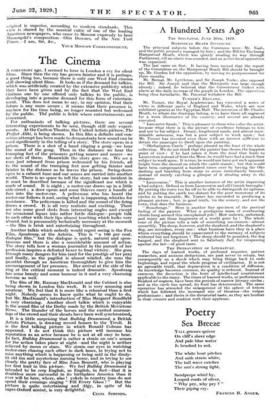The Cinema
A FORTNIGHT ago, I seemed to hear in London a cry for silent films. Since then the cry has grown fainter and it is perhaps, a good thing too, because there is only one West End cinema still showing silent films. It looks as if the demand for talkies, which was artificially created by the extensive publicity which they have been given and by the fact that the West End cinemas one by one offered only talkies to the public, is developing into a genuine demand for this form of entertain- ment. This does not mean to say, in my opinion, that their future is any more secure ; it means that their presence is, anyhow for the time being, no longer resented but welcomed by the public. The public is fickle where entertainments are concerned.
For enthusiasts of talking pictures, there are several interesting experiments to be seen, though still only experi- ments. At the Carlton Theatre, the United Artists picture, The Perfect Alibi, is being shown. In this film a definite and con- scious attempt has been made to demonstrate how sound can be used significantly in the telling of a story. The story opens in a prison. There is a shot of a hand ringing a gong—we hear the sound of the gong. Then in the distance we hear the tramping feet of the prisoners getting nearer and nearer—we see shots of them. Meanwhile the story goes on. We see a man just released from prison welcomed by his friends, all to the sound of the tramping feet now getting fainter and fainter in the distance as he leaves the prison. Swing-doors open to a cabaret tune and our senses are carried into another world. There is no space to tell the story, but one incident in it must be described because of the significant use which is made of sound. It is night ; a motor-car draws up in a little side-street ; a door opens and some thieves carry a bundle of furs into the motor-car. A policeman who has heard the motor-car follows it and, seeing what is happening, whistles for assistance. The policeman is killed and the sound of the firing draws a crowd. It is all very realistic and exciting. There are also some good shots from interesting angles and except for occasional lapses into rather futile dialogue—people talk to each other with their lips almost touching which loOks very absurd, but is presumably technically necessary at the moment —the film is brisk and entertaining throughout.
Another talkie which nobody would regret seeing is the Fox Film, Speakeasy, at the Astoria. This is " a 100 per cent. dialogue film, but the dialogue is quick, natural and spon- t,aneous and there is also a considerable amount of action. The story tells how a woman journalist in the pursuit of her profession inspires a defeated boxer to final victory. She goes through many dangers for him (and for the prestige of her pen) and finally, as the pugilist is almost winded, she runs the gauntlet through an American thoroughfare to give him the encouragement of her presence. Her arrival at the side of the ring at the critical moment is indeed dramatic. Speakeasy has some beauty and some humour in it and a very charming heroine as well.
The film of Mr. Ramsay MacDonald and the Cabinet is also being shown ,in London this week. It is very amusing and amateur. We feel that it is more like a rehearsal than a first night. Nobody seems to know quite what he ought to do, but Mr. MacDonald's introduction of Miss Margaret Bondfield is very charming. Another short talkie which is enjoyable is the sound film of the Derby made by the British Movietone News. The thunder of the horses and the exeited murmur- ings of the crowd and their shouts have been well synchronized.
It is a little surprising that Bulldog Drummond, a British Artists Picture, is- drawing record houses to the Tivoli. It is the first talking picture in which Ronald Colman has appeared. I do not think this picture will increase his reputation as an actor because he is not at all easy to hear. In fact, Bulldog Drummond is rather a strain on one's senses for the action takes place at night—and the night is neither relieved by moon or stars. We strain our eyes in watching motor-cars chasing each other in dark lanes, in trying not to miss anything which is happening or being said in the dimly- lit old inn and mysterious nursing home, and in trying to see clearly the pretty face of Miss Joan Bennett, who is playing her first lead in this picture. We feel Bulldog Drummond is intended to be very English, so English, in fact—that it is doubtless more successful in its birthplace America than it ever will be here, where, alas yokels in country inns do not spend their evenings singing " Fill I.very Glass ! " But the picture is quite entertaining and Algy, in spite of his super-Oxford accent, is- very delightful. • SIMPsON.












































 Previous page
Previous page